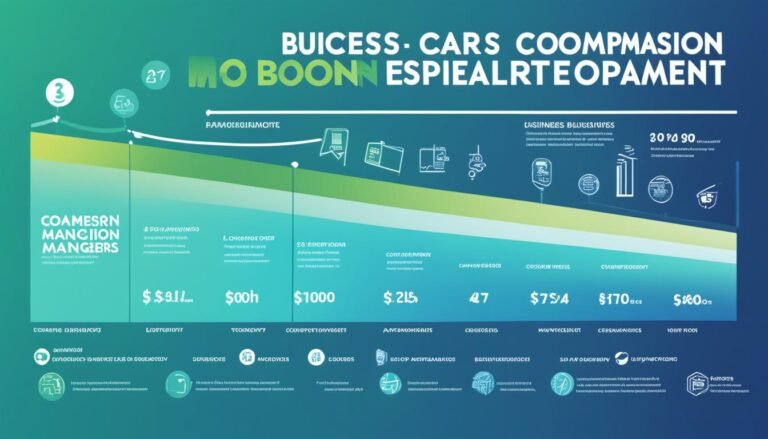Achieving Success: Goals for Managers Guide
Setting goals is crucial for managers to drive performance and strategic growth. Effective goal setting provides a clear direction for managers, aligns individual, team, and company goals, and ensures progress towards success. In this guide, we will explore the importance of setting goals for managers and introduce the SMART goals framework, a proven method for setting effective and attainable objectives.
As a manager, setting goals allows you to define your managerial objectives, focus your efforts on what matters most, and measure your performance. Whether you are a new manager looking to establish yourself or an experienced leader seeking to elevate your team’s success, having strategic goals in place will guide your decision-making and drive your professional growth.
Key Takeaways:
- Setting goals is crucial for managers to drive performance and strategic growth.
- The SMART goals framework helps managers set specific, measurable, attainable, relevant, and time-bound objectives.
- Clear success criteria and tracking progress are essential for goal achievement.
- Investing in leadership skills, professional development, and building strong relationships enhances managerial effectiveness.
- Setting and achieving goals contributes to the overall success of teams and organizations.
The SMART Goals Framework for Managers
Setting goals is an integral part of effective management. By utilizing the SMART goals framework, managers can establish clear objectives that drive success and strategic growth. The SMART acronym stands for specific, measurable, attainable, relevant, and timely goals. Let’s explore each element of this framework:
Specific Goals
To set specific goals, managers need to clearly define what needs to be accomplished. Using action verbs and providing precise details helps avoid ambiguity and ensures everyone understands the desired outcome.
Measurable Goals
Measuring goals allows managers to track progress and determine if the desired outcome has been achieved. By establishing success criteria and implementing systems like the red, yellow, and green performance assessment, managers can monitor and evaluate their team’s progress effectively.
Attainable Goals
When setting goals, it’s crucial to assess whether the team has the necessary resources and support to achieve them. Goals should be realistic and within reach, taking into consideration the team’s capabilities, timeframe, and potential obstacles.
Relevant Goals
Goals should align with the broader objectives of the organization and contribute to its overall success. Managers should ensure that their goals have a direct impact on the team’s performance, as well as the company’s strategic priorities.
Timely Goals
Time-bound goals have a realistic timeframe for completion. Managers need to establish deadlines and milestones that drive progress and create a sense of urgency. A well-defined timeline helps teams stay focused and motivated to achieve their goals.
By following the SMART goals framework, managers can set objectives that are specific, measurable, attainable, relevant, and timely. This structured approach to goal-setting enhances performance, aligns individual and team goals, and drives success.
Implementing the SMART goals framework not only benefits individual managers but also contributes to the overall growth of the team and organization. This process ensures that goals are well-defined, achievable, and closely aligned with strategic priorities.
| Element | Description |
|---|---|
| Specific | Goals should be clearly defined and avoid ambiguity. |
| Measurable | Goals should have defined success criteria and be trackable. |
| Attainable | Goals should be realistic and within reach. |
| Relevant | Goals should align with strategic priorities and contribute to overall success. |
| Timely | Goals should have a realistic timeframe for completion. |
Beginning with the End in Mind: Setting Goals for Employees
When it comes to setting goals for employees, managers should adopt a proactive approach by beginning with the end in mind. By clarifying the desired outcomes and aligning personal goals with strategic priorities, managers can create a clear path for their team members’ success. This process not only establishes a sense of purpose but also ensures that every goal contributes to the overall objectives of the organization.
Setting clear success criteria is essential to help employees track their progress and evaluate their achievements. It provides them with a tangible measure of success and motivates them to strive for continuous improvement. Clear success criteria also facilitate objective performance evaluations and enable managers to provide constructive feedback and support along the way.
“Beginning with the end in mind means to begin each day, task, or project with a clear vision of the desired direction and destination.” – Stephen R. Covey
By aligning personal goals with strategic priorities, managers ensure that every employee’s efforts contribute to the organization’s overarching objectives. This alignment creates a cohesive and synchronized work environment, where individual goals are interconnected and support the collective success of the team.
Benefits of Beginning with the End in Mind
Beginning with the end in mind has numerous benefits for both employees and organizations. Some of these benefits include:
✔ Enhanced clarity and focus
✔ Improved motivation and engagement
✔ Increased alignment with strategic priorities
✔ Accelerated performance and goal attainment
✔ Enhanced collaboration and teamwork
✔ Better tracking and evaluation of progress
By setting goals that begin with the end in mind, managers can empower employees to achieve their full potential while contributing to the success of the organization.
Goal-Setting Frameworks for Employees
When setting goals for employees, managers can utilize various frameworks to ensure clarity and effectiveness. Some widely recognized goal-setting frameworks include:
| Framework | Description |
|---|---|
| SMART Goals | Specific, Measurable, Achievable, Relevant, and Time-bound goals that provide a clear roadmap for success. |
| OKRs (Objectives and Key Results) | Set ambitious objectives and measurable key results to drive alignment, focus, and continuous improvement. |
| Balanced Scorecard | Align individual goals with strategic objectives in key performance areas, such as financial, customer, internal operations, and learning and growth. |
| Management by Objectives (MBO) | A collaborative goal-setting process that involves managers and employees jointly defining objectives and establishing a plan for achieving them. |
These frameworks provide managers with a structured approach to goal setting and ensure that goals are well-defined, achievable, and aligned with strategic priorities.
By beginning with the end in mind, aligning personal goals with strategic priorities, and providing clear success criteria, managers can set their employees up for success and drive the overall performance and growth of the organization.
Example SMART Goals for Leaders and Managers
SMART goals for leaders and managers are essential for driving performance, fostering collaboration, and achieving strategic objectives. These goals follow the SMART framework, making them specific, measurable, attainable, relevant, and time-bound. By setting SMART goals, leaders and managers can guide their teams towards success.
Examples of SMART Goals for Leaders:
- Develop internal talent by implementing a mentorship program that pairs high-potential employees with senior leaders within the organization.
- Create a growth mindset within the team by organizing regular learning and development workshops focused on embracing challenges and continuous improvement.
- Improve employee onboarding by implementing a comprehensive orientation program that provides new hires with the necessary skills and knowledge to succeed in their roles.
- Expand the organization’s retail presence by opening three new branches in target locations within the next fiscal year.
Examples of SMART Goals for Leadership Development:
- Expand the business presence by entering a new market and increasing market share by 15% within the next two years.
- Improve employee development and retention by implementing a comprehensive training program that provides opportunities for skill enhancement and encourages career growth.
- Identify high-potential employees within the team and develop them for future leadership roles through targeted training, mentoring, and stretch assignments.
These examples demonstrate how leaders and managers can set SMART goals that align with their organization’s strategic priorities and contribute to sustainable growth. By focusing on specific outcomes, measurable progress, realistic targets, and timely achievement, leaders and managers can drive performance, develop their teams, and achieve success.
Strategies for Effective Goal Setting
In order to set goals that will lead to success, managers can utilize various strategies. One such strategy is the SMART methodology, which provides a structured approach to goal setting. This methodology ensures that goals are realistic, specific, and measurable, making them more attainable for individuals and teams. By following the SMART framework, managers can make progress towards their objectives in a focused and efficient manner.
Here are some strategies for effective goal setting:
- Clarify the Vision: Before setting goals, it is important to have a clear understanding of the desired outcome. By clarifying the vision, managers can align their goals with the overall objectives of the company or team.
- Break Down Goals: Large objectives can be overwhelming, so breaking them down into smaller, more manageable goals is essential. These specific goals should contribute to the overall vision and provide a roadmap for success.
- Assess Impact: It is important to evaluate the impact of each goal. Consider the resources required, potential challenges, and the overall benefit to the organization or team. This assessment helps prioritize goals and ensure they are aligned with strategic priorities.
- Make Adjustments: As progress is made towards goals, it is important to regularly review and make adjustments if necessary. This flexibility allows for adaptation to changing circumstances and ensures that goals remain relevant and achievable.
- Celebrate Successes: Celebrating milestones and achievements along the way provides motivation and encouragement. Recognizing progress boosts morale and maintains momentum towards the ultimate goal.
- Track Progress: Tracking progress is crucial for goal setting. Managers can use software or other tools to monitor progress and identify areas that require attention. This enables timely adjustments and helps keep everyone on track.
Using structured materials, such as goal-setting templates or tracking sheets, can further enhance the effectiveness of goal setting. These materials provide a clear framework and ensure consistency in the goal-setting process. In addition, feedback surveys can gather valuable insights and opinions from team members, making the goal-setting process more collaborative and inclusive.
Goal achievement can also be facilitated through milestone planning. By setting milestones along the way, managers can better track progress and measure success. Milestones act as checkpoints, providing opportunities to evaluate progress and make necessary adjustments to stay on track.
Note: The table below provides an example of how goal-setting strategies can be implemented using the SMART methodology.
| Goal | Strategy |
|---|---|
| Increase customer satisfaction | Break down the goal into specific metrics, such as increasing customer satisfaction ratings by 10% within six months. |
| Improve employee productivity | Implement feedback surveys to gather insights and identify areas for improvement. Set specific productivity targets and track progress regularly. |
| Enhance team collaboration | Create structured materials, such as team-building exercises and communication guidelines, to foster collaboration. Define specific team goals and celebrate successful collaboration efforts. |
By employing effective strategies for goal setting, managers can enhance their ability to achieve success and drive progress towards desired outcomes. The SMART methodology, combined with structured materials, feedback surveys, milestone planning, and progress tracking, creates a robust framework for setting and achieving goals.
Enhancing Leadership Skills
As managers set goals and work towards achieving them, it is essential to enhance their leadership skills. By developing these skills, managers can effectively lead their teams and navigate the challenges of the business world with confidence and resilience.
Communication with Influence
Strong communication skills are fundamental to successful leadership. Managers must be able to convey their ideas and influence others effectively. By honing their communication skills, managers can inspire and motivate their teams, build strong relationships, and foster a positive work environment.
Executive Presence
Developing an executive presence is crucial for managers who want to make an impact. This involves projecting confidence, professionalism, and credibility in all interactions. With a strong executive presence, managers can command respect, earn trust, and inspire confidence in their leadership.
Conflict Management
Conflict is inevitable in the workplace, and effective managers must possess the skills to navigate and resolve conflicts. By learning conflict management strategies, managers can foster collaboration, resolve disputes, and create a harmonious work environment.
Effective Feedback
Providing constructive feedback is vital for employee growth and development. Managers who master the art of giving feedback can empower their team members to reach their full potential. By delivering feedback effectively, managers can inspire growth, enhance performance, and cultivate a culture of continuous improvement.
Navigating Uncertainty
The business landscape is dynamic and unpredictable. Managers must be able to navigate uncertainty with confidence and adaptability. By developing skills such as decision-making, risk management, and resilience, managers can lead their teams through change and uncertainty, ensuring continued success.
Enhancing leadership skills is an ongoing process that requires practice, self-reflection, and a commitment to continuous learning. By investing in personal and professional growth, managers can become effective leaders who drive organizational success.
Investing in Professional Development
Effective managers understand the value of continuous growth and development. By investing in their professional development, they enhance their skills, knowledge, and overall effectiveness. Setting clear goals for professional development helps managers stay competitive in their careers and adapt to the ever-changing business landscape.
Here are some key areas where managers can focus their professional development goals:
1. Pursuing Professional Certificates or Degrees
Obtaining industry-recognized certifications or advanced degrees can significantly boost a manager’s credentials and credibility. It demonstrates a commitment to staying up-to-date with the latest industry trends and best practices. Some popular certifications for managers include Project Management Professional (PMP), Certified ScrumMaster (CSM), and Six Sigma Green Belt.
2. Expanding Professional Networks
Networking plays a crucial role in professional advancement. By connecting with peers, industry experts, and mentors, managers can gain valuable insights, access new opportunities, and foster mutually beneficial relationships. Attending conferences, industry events, and joining professional associations are effective ways to expand one’s professional network.
3. Learning New Technology
Technology is constantly evolving, and managers need to stay updated with the latest tools and platforms relevant to their industry. Learning new technology not only improves productivity but also enables managers to effectively leverage digital tools for better decision-making, communication, and collaboration.
4. Improving Storytelling Abilities
Storytelling is an essential skill for managers to inspire and influence others. Effective storytelling helps communicate ideas, engage employees, and create a compelling vision. Managers can improve their storytelling abilities through workshops, reading relevant literature, and practicing storytelling techniques in various professional settings.
5. Practicing Self-Care
Achieving professional success should not come at the expense of one’s well-being. Managers should prioritize self-care to maintain mental and physical health. This may include regular exercise, mindfulness practices, taking breaks, and setting boundaries between work and personal life. Prioritizing self-care ensures that managers can perform at their best and lead their teams effectively.
By investing in professional development goals, managers demonstrate their commitment to continuous learning and improvement. They position themselves as leaders who are adaptive, knowledgeable, and equipped to navigate challenges and drive success for their teams and organizations.
Building Stronger Working Relationships
Strong working relationships are crucial for fostering a positive and productive work environment. Managers play a vital role in building these relationships and can set specific goals to strengthen them. By investing in workplace friendships, practicing peer coaching and mentorship, promoting inclusive leadership, and contributing to intellectual capital, managers can create a supportive and collaborative team environment.
Fostering Workplace Friendships
Building strong relationships starts with creating a friendly and inclusive work culture. Encouraging social interactions among team members fosters a sense of camaraderie and builds trust. Managers can set goals to organize team-building activities, such as lunch outings, game nights, or team volunteer activities. These opportunities for informal interactions help employees connect on a personal level, leading to stronger working relationships.
Practicing Peer Coaching and Mentorship
Peer coaching and mentorship programs provide valuable opportunities for employees to learn from one another and grow professionally. Managers can set goals to establish formal or informal programs that encourage knowledge sharing and professional development among team members. By pairing employees with similar expertise or complementary skills, managers can foster a culture of learning and collaboration.
Promoting Inclusive Leadership
Inclusive leadership is essential for creating an environment where every team member feels valued and included. Managers can set goals to promote diversity, equity, and inclusion within their teams. This can include initiatives such as mentoring employees from underrepresented groups, creating opportunities for diverse voices to be heard, and fostering a workplace culture that values and celebrates differences.
Contributing to Intellectual Capital
Intellectual capital refers to the collective knowledge, skills, and expertise within an organization. Managers can set goals to foster the growth and development of intellectual capital by encouraging employees to contribute their ideas, insights, and expertise. This can include initiatives such as organizing knowledge-sharing sessions, facilitating cross-functional projects, or creating platforms for employees to showcase their expertise.
By investing in these goals, managers can build stronger working relationships, enhance collaboration, and create a positive work environment. The result is a motivated and engaged team that achieves success together.
| Benefits of Building Stronger Working Relationships | Actions to Achieve Goals |
|---|---|
|
|
Embracing Change and Adapting
Change is an inevitable part of the workplace. As a manager, it is essential to embrace change and adapt to uncertainty. By setting goals to embrace change, you can develop the resilience needed to navigate unexpected challenges and maintain productivity in a constantly evolving work environment.
One key aspect of embracing change is improving your time management skills. Effective time management allows you to prioritize tasks, stay focused on what matters most, and make the most of your available resources. By setting goals related to time management, such as creating a daily schedule or using productivity techniques like the Pomodoro Technique, you can optimize your time and better adapt to changing priorities.
Another important goal to set is prioritization. When faced with change, it can be easy to feel overwhelmed. By prioritizing tasks and projects based on their importance and urgency, you can ensure that you are effectively allocating your time and energy. Tools like Eisenhower’s Urgent-Important Matrix can help you prioritize tasks and make informed decisions about where to focus your efforts.
Delegation is another valuable skill to develop when embracing change. Recognize that you can’t do everything on your own and that delegating tasks to the right team members can free up your time and empower them to contribute their expertise. Set goals to improve your delegation skills, such as identifying tasks that can be delegated and providing clear instructions and support to your team members.
Embracing change requires resilience, time management, prioritization, and effective delegation. By setting goals in these areas, you can navigate uncertainty and adapt to whatever challenges come your way.
Goal: Developing Resilience
Change can be stressful and challenging, but developing resilience can help you bounce back and thrive in the face of uncertainty. Set goals to improve your resilience by:
- Practicing self-care and prioritizing your mental and physical well-being
- Building a strong support network and seeking guidance from mentors or coaches
- Embracing a growth mindset and viewing setbacks as opportunities for learning and growth
Goal: Effective Time Management
Setting goals to improve your time management skills can help you stay organized and focused amid change. Consider setting goals such as:
- Creating a daily or weekly schedule to plan your tasks and allocate your time efficiently
- Using productivity techniques like time blocking or the Pomodoro Technique to optimize your productivity
- Minimizing distractions and establishing boundaries to protect your time and maintain focus
Goal: Prioritization
When faced with change, it is important to prioritize tasks and projects based on their importance and urgency. Set goals related to prioritization, such as:
- Using tools like the Eisenhower Matrix to categorize tasks and make informed decisions about what to prioritize
- Regularly reviewing and adjusting your priorities as new information or changes arise
- Communicating effectively with stakeholders to ensure alignment on priorities
Goal: Delegation
Delegation is a valuable skill that can help you navigate change by empowering your team and freeing up your own time. Set goals to improve your delegation skills by:
- Identifying tasks that can be delegated and matching them with team members’ strengths and capabilities
- Providing clear instructions and guidance to ensure successful completion of delegated tasks
- Regularly checking in with your team members and offering support as needed
By embracing change, developing resilience, improving time management skills, prioritizing effectively, and delegating tasks, you can adapt to uncertainty and thrive in a dynamic work environment.
| Goal | Description |
|---|---|
| Developing Resilience | Practicing self-care, building a support network, and embracing a growth mindset |
| Effective Time Management | Creating a schedule, using productivity techniques, and minimizing distractions |
| Prioritization | Using tools like the Eisenhower Matrix, regularly reviewing priorities, and effective communication |
| Delegation | Identifying tasks, providing clear instructions, and offering support to team members |
Giving Back and Developing Others
Effective managers understand that success is not only about personal growth but also about giving back to their teams and organization. By investing in the development of others, managers contribute to a positive work environment, build trust and collaboration, and strengthen the overall team.
Fostering a Coaching Culture
A coaching culture is essential for the professional and personal growth of team members. By adopting a coaching mindset and providing guidance and support, managers can empower their team members to reach their full potential. This includes taking the time to listen, ask thought-provoking questions, and provide constructive feedback.
Promoting Knowledge Sharing
Encouraging knowledge sharing within the team allows for the exchange of ideas, expertise, and best practices. By creating platforms and opportunities for team members to share their knowledge and experiences, managers foster a culture of continuous learning and growth.
Teaching Skills to Team Members
Managers play a vital role in teaching essential skills to their team members. By identifying the strengths and areas for improvement of each team member, managers can provide targeted training and mentorship to enhance their skills and career development. This not only benefits the individual but also strengthens the team’s capabilities as a whole.
Providing Peer Support
Peer support is a valuable resource for personal and professional growth. Managers can facilitate peer support by encouraging collaboration, teamwork, and open communication within the team. This creates a supportive environment where team members can learn from each other, share challenges and successes, and provide mutual support.
“The true measure of leadership is not just how well you lead, but how well you develop and empower others to lead.” – Simon Sinek
By embracing a mindset of giving back and developing others, managers can create a positive and collaborative work culture where everyone has the opportunity to grow and thrive.
Conclusion
Setting and achieving goals is crucial for achieving success as a manager. By utilizing the SMART goals framework, managers can establish realistic and measurable objectives that drive performance and contribute to strategic growth. Effective goal setting involves starting with a clear vision in mind, defining explicit success criteria, monitoring progress, and adapting when necessary. Furthermore, investing in leadership skills, professional development, building strong relationships, and prioritizing personal well-being all enhance managerial effectiveness. By consistently setting and achieving goals, managers not only reach personal milestones but also contribute to the overall success of their teams and organizations.







